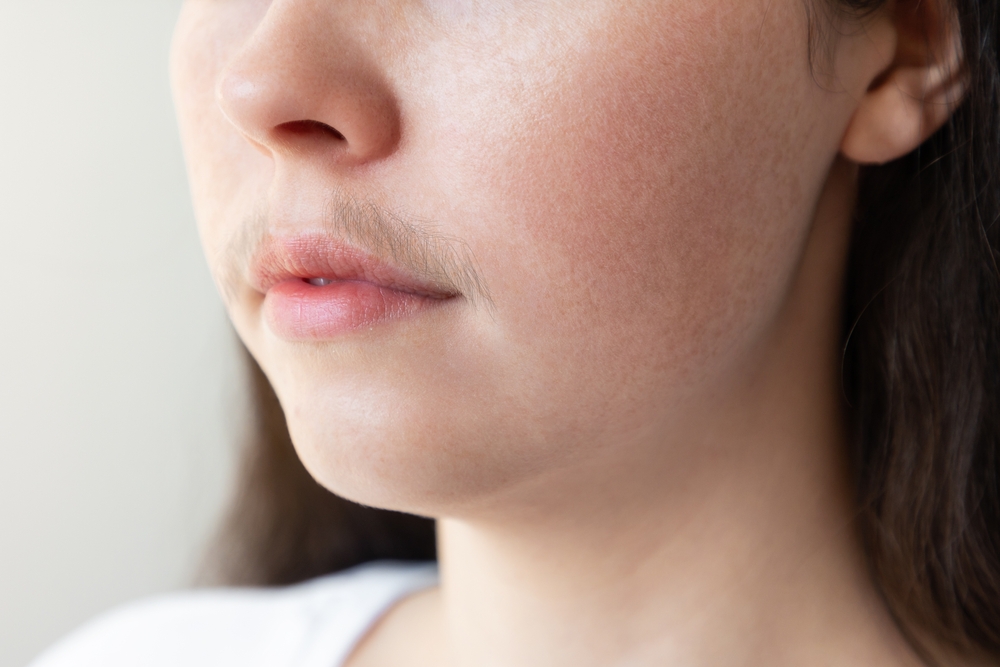Facial hair in women, often referred to as hirsutism, is a common concern that can significantly impact a woman’s self-esteem and confidence. This condition involves the growth of coarse, dark hair in areas where it’s typically less common, such as the face, chest, and back. While it’s a natural part of human biology, understanding what causes facial hair in women can help address this issue effectively.
Hormonal Imbalance
One of the primary causes of facial hair in women is hormonal imbalance. The hormone responsible for this is testosterone, which is present in both men and women but in different amounts. In women, an excess of testosterone can lead to the development of facial hair. Conditions that can cause hormonal imbalances include polycystic ovary syndrome (PCOS), adrenal disorders, and certain medications.
Polycystic Ovary Syndrome (PCOS)
PCOS is one of the most common endocrine disorders among women of reproductive age. It affects how a woman’s ovaries work, leading to irregular menstrual cycles, difficulty getting pregnant, and excess hair growth. The exact cause of PCOS is unknown, but it’s believed to be related to insulin resistance and high levels of insulin, which can stimulate the ovaries to produce more testosterone.
Adrenal Disorders
Adrenal disorders, such as congenital adrenal hyperplasia (CAH) and adrenal tumors, can also lead to increased testosterone levels, resulting in facial hair growth. These conditions affect the adrenal glands, which produce hormones that regulate metabolism, the immune system, blood pressure, and other essential functions.
Medications
Certain medications, including some birth control pills, steroids, and drugs used to treat cancer or depression, can increase testosterone levels and lead to facial hair growth.
Genetics
Genetics play a significant role in determining the likelihood of developing facial hair in women. If there’s a family history of hirsutism, a woman may be more predisposed to developing this condition. Genetic factors can influence the amount of testosterone produced and how the body responds to it.
Stress and Lifestyle Factors
While not direct causes, stress and certain lifestyle factors can exacerbate hormonal imbalances and contribute to the development of facial hair in women. High-stress levels can affect hormone production, potentially increasing testosterone levels. Additionally, a diet high in processed foods and low in fruits and vegetables can contribute to insulin resistance, which is linked to PCOS and higher testosterone levels.
Treatment Options
There are several treatment options available for women dealing with facial hair growth. The choice of treatment depends on the underlying cause and the severity of the condition.
Laser Hair Removal
Laser hair removal is a popular and effective method for reducing facial hair. It works by targeting the pigment in the hair, effectively disabling the hair follicles without damaging the surrounding skin. This treatment is suitable for all skin types and can be performed on various parts of the body, including the face.
Electrolysis
Electrolysis is another method that involves inserting a probe into each hair follicle and applying an electric current to destroy the hair-producing cells. This treatment is more time-consuming than laser hair removal but can be effective for treating small areas or individual hairs.
Prescription Medications
Prescription medications, such as spironolactone, finasteride, and eflornithine cream, can help reduce the amount of testosterone in the body, thereby slowing down hair growth. These medications should be used under the supervision of a healthcare provider.
Hormonal Treatments
In cases where hormonal imbalances are the root cause, treatments such as birth control pills, anti-androgens, or medications to treat PCOS can help manage the condition and reduce facial hair growth.
Understanding the causes of facial hair in women is crucial for finding effective treatments. Whether due to hormonal imbalances, genetics, or lifestyle factors, there are numerous options available to manage this condition. Consulting with a healthcare provider or a dermatologist can help determine the best course of action based on individual needs and circumstances. At Laser Cambridge, we offer a range of treatments, including laser hair removal, to help women feel confident and comfortable in their own skin.

